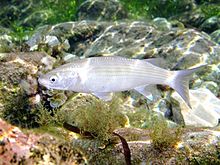The thicklip grey mullet, Chelon labrosus, is a coastal fish of the family Mugilidae. It typically is about 32 cm (13 in) long, with 75 cm (30 in) being the maximum recorded.[3] It is named after its thick upper lip and silvery-grey appearance.[citation needed]
| Thicklip grey mullet | |
|---|---|

| |
| Scientific classification | |
| Domain: | Eukaryota |
| Kingdom: | Animalia |
| Phylum: | Chordata |
| Class: | Actinopterygii |
| Order: | Mugiliformes |
| Family: | Mugilidae |
| Genus: | Chelon |
| Species: | C. labrosus
|
| Binomial name | |
| Chelon labrosus (A. Risso, 1827)
| |

| |
| Chelon labrosus range | |
| Synonyms[2] | |
It is a common fish of shallow, sheltered coasts, estuaries, and around power station and sewer outfalls; it can also enter fresh water areas.[citation needed]
It lives in the northeastern Atlantic Ocean from Iceland to Senegal and Cape Verde, including the Mediterranean Sea and the southwestern Black Sea. This species is partially migratory, heading northwards in summer.[citation needed]
It feeds mainly on benthic diatoms, epiphytic algae, small invertebrates and detritus.[citation needed]
The thicklip grey mullet lays its eggs in winter. Both eggs and fry are pelagic.[citation needed]
Human interaction
editThe thicklip grey mullet is valued both as a food fish and as a tenacious game fish.[4]
Parasites
editAs most species of fish, the thicklip grey mullet is infected by a variety of parasite species. A 2023 paper showed that it harbors eleven species of Myxobolus (Myxozoa).[5]
References
edit- ^ Freyhof, J. & Kottelat, M. (2008). "Chelon labrosus". IUCN Red List of Threatened Species. 2008: e.T135689A4182365. doi:10.2305/IUCN.UK.2008.RLTS.T135689A4182365.en. Retrieved 8 December 2023.
- ^ "Synonyms of Chelon labrosus (Risso, 1827)". FishBase. Retrieved 28 October 2018.
- ^ Froese, Rainer; Pauly, Daniel (eds.). "Chelon labrosus". FishBase. September 2008 version.
- ^ "The thicklip Grey Mullet is regarded widely as the hardest fighting fish swimming in Irish waters" in [1]
- ^ Guimarães, José; Casal, Graça; Alves, Ângela; Araújo, Catarina; Rocha, Sónia (2023). "Myxozoan survey of thicklip grey mullet Chelon labrosus reinforces successful radiation of Myxobolus in mugiliform hosts". Parasite. 30: 26. doi:10.1051/parasite/2023029. PMC 10318956. PMID 37401858.
